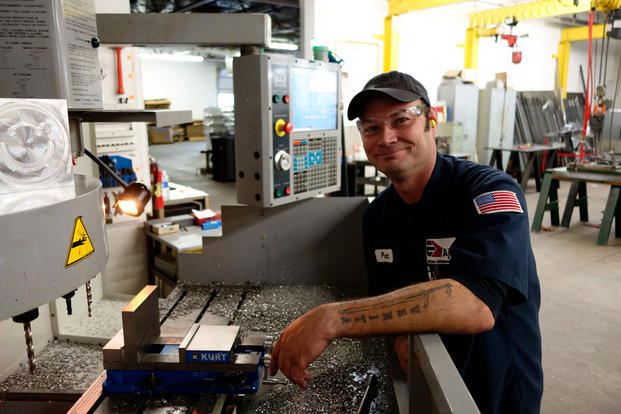Transitioning from the life of a service member to the civilian working world can be tough. The culture is different, the old rules don't apply anymore, and connecting with civilians on a professional level can be a strange experience. The good news is that while it might take a few years to acclimatize fully, there are plenty of industries where the work ethic and culture of the military are welcome and familiar. Even better, some of those industries need workers and are actively hiring veterans.
The manufacturing industry is currently expecting roughly 2.5 million openings in the next decade, and its culture is very similar to what veterans experienced when they served. If you're unsure about the benefits of working in manufacturing, just look at veteran Arthur "Patt" Patterson. He served for well over 10 years in the U.S. Army and eventually found success, as well as upward mobility, in the manufacturing industry.
From the time he turned 17, Patterson was involved with the military. He joined the Minnesota National Guard and became a cavalry scout. He later became a 13E and worked with artillery. After a fulfilling career in the Army, he turned to the civilian world and found himself bouncing around numerous jobs, never holding on to one for very long. Despite his experience in the military, work ethic and leadership abilities, Patterson couldn't find a place of employment that quite respected his abilities or provided him the camaraderie and team effort he enjoyed in the military.
In 2012, Patterson attended a local veteran job fair and was connected with E.J. Ajax Metal Forming Solutions, which specializes in metal stamping, sheet-metal fabrication, fiber-optic laser cutting and more. Patterson was hired on the spot, and he hasn't looked back since.
One of the most critical elements to Patterson's success with Ajax -- and its performance as a company -- is how highly it values teamwork. Like the military, Ajax ensures that its employees receive quality training and become highly skilled professionals. Patterson was given a stipend to use with his GI Bill and attended special programs in order to advance within the company. The combined financial support allowed him to attend school at night for free and learn new manufacturing techniques and earn new certifications.
Because of how the manufacturing process works, no task can be completed by fewer than three individuals. It not only fosters close teamwork, but a sense that everyone is "part of something bigger," according to Patterson. "Everyone has equal value; everyone accomplishes tasks as a group."
Patterson also likes that his civilian job uses many of the same skills he developed in the Army. Although the technical aspects of firing artillery aren't the same as manufacturing work, Patterson said "the military mindset pays off. You need to have attention to detail, precision, problem solving skills and the ability to think spatially."
The manufacturing industry is also a place where computers can't always replace hard-won experience. Not only does the industry need fresh blood, those who stick with it for the long haul should have relative job security for many years to come.
"The old ways never die," Patterson said. "Computers aren't always the best idea. The technical knowledge and experience of the older guys can't easily be replaced. It would take two computers and three new people to complete the same amount and type of work."
To any veterans on the fence about joining the manufacturing industry, Patterson says to treat it like entering a new military occupational specialty, or MOS, and learn from the bottom. Beginners should learn as much as they can as fast as they can, and they'll be rewarded for it in the long run. According to Patterson, one advantage of being a veteran is that you've likely hit your wall more than once and know what your true limits are. On the other hand, civilians usually haven't come close to pushing themselves as much, and they might not know how or how far they can go.
If you're considering the manufacturing industry, you can reach out to the Get Skills to Work program to get started. Designed to recruit and retain veterans, Get Skills to Work is a coalition of manufacturing companies and community and technical schools. They provide information on where to get the right education, how the industry operates and even help match the experience of your MOS with different types of manufacturing jobs.
Find the Right Veteran Job
Whether you want to polish your resume, find veteran job fairs in your area or connect with employers looking to hire veterans, Military.com can help. Subscribe to Military.com to have job postings, guides and advice, and more delivered directly to your inbox.











